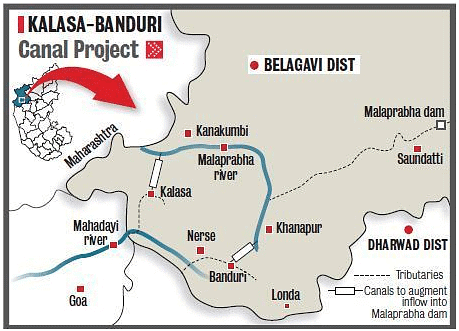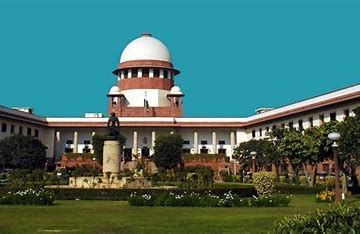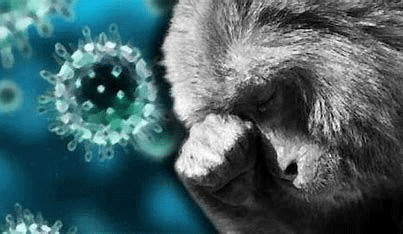UPSC Daily Current Affairs- 11th February 2024 | Current Affairs & Hindu Analysis: Daily, Weekly & Monthly PDF Download
| Table of contents |

|
| GS-I |

|
| Kalasa-Bhanduri Project |

|
| GS-II |

|
| Decline of America's leadership |

|
| Supreme Court Collegium |

|
| Adverse Possession |

|
| GS-III |

|
| KYASANUR FOREST DISEASE (KFD) |

|
| Inheritance Tax |

|
GS-I
Kalasa-Bhanduri Project
Subject: Geography

Why in News?
The National Board for Wildlife (NBWL) recently deferred the decision on diverting forest land from the Kali and Sahyadri tiger reserves for the construction of a part of the Karnataka government's Kalasa-Bhanduri Project.
About Kalasa-Bhanduri Project:
- The project involves the construction of dams and a canal system to divert water from the Mahadayi River, located in Goa, to the Malaprabha River (a tributary of the Krishna River) basin in Karnataka.
- The main goal of the project is to meet the drinking water needs of the districts of Belagavi, Dharwad, Bagalkot, and Gadag in Karnataka.
- Though the project was first proposed in the early 1980s, it has remained on paper owing to a dispute between Karnataka, Goa, and Maharashtra.
- As per plans, barrages are to be built against Kalasa and Bhanduri streams— tributaries of Mahadayi — and water diverted towards Karnataka’s parched districts.
Key facts about Mahadayi River:
- Origin: It rises in the Western Ghats from the Bhimgad Wildlife Sanctuary in Khanapur taluk of Karnataka’s Belagavi district.
- The river travels35 km in Karnataka, and 82 km in Goa before joining the Arabian Sea at Panaji (North Goa).
- Also called Mandovi in Goa, Mahadayi is a rain-fed river that is shared between Karnataka and Goa for their water needs.
- The Salim Ali Bird Sanctuary is located on the island of Chorao in the Mandovi River.
- Major Tributaries: Kalasa Nala, Bhanduri Nala, Surla Nala, Haltar Nala, Poti Nala, Mahadayi Nala, Pansheer Nala, Bail Nala and Andher Nala.
Source: Hindustan Times
GS-II
Decline of America's leadership
Subject: International Relations

Why in News?
A divided American polity combined with a perception of its declining power is creating ripples among diplomatic circles.
Background: Post the collapse of USSR, American hegemony was firmly established. But with recent geopolitical and geoeconomic changes, global order is undergoing major changes shifting power balance from the west.
US as a superpower and its decline
- The traditional strength of US are its values platform, emphasising democracy and human rights, its military power, position in the global financial system and possessing formidable economic resource and technology.
- After Second World War, US shaped the rule based international system. In reality, it was a power based system, where US considered itself exempt from the common standards of international conduct.
- America’s refusal to honour its own international obligations has dented its credibility.
- Domestic polarisation combined with sharp ideological divide has rendered cooperation in its two party system non-existent questioning its democratic soft power.
- The legitimacy of US dominated institutions has been continuously questioned.
Potential negative repercussions for India:
- India will have to carefully craft its relationship with US and Russia, keeping in mind the declining role of US.
- A decline in American power might create a power vacuum. Other major powers, such as China or Russia, may seek to fill this vacuum, potentially impacting India’s strategic position.
- A weakened US presence in Asia could embolden China to assert its dominance more aggressively in the region. This could lead to increased tensions and the possibility of conflict
- Weekend US economy combined with loss of leadership in technology space could lead to declining trade and technology access for India.
- India has benefited from its strategic partnership with the US on issues like counter-terrorism and maritime security. A decline in US power could weaken these partnerships, leaving India to face these challenges alone or seek new partners.
Potential positive repercussions:
- Greater strategic autonomy: A less dominant US could provide India with more space to pursue its own interests and forge new partnerships, diversifying its foreign policy.
- Opportunity for leadership: As the US steps back, India could emerge as a leading power in Asia, playing a more significant role in regional affairs and shaping the global order.
- Increased self-reliance: A decline in US dependence could motivate India to accelerate its own economic and military development, fostering greater self-reliance.
Source: The Hindu
Supreme Court Collegium
Subject: Polity and Governance

Why in News?
The Supreme Court recently quashed an Andhra Pradesh High Court order that voiced strong disapproval over the apex court Collegium transferring two Chief Justices and castigated the Andhra Pradesh Chief Minister for his apparent attempts to undermine it.
About Supreme Court Collegium:
- It is a system under which appointments and transfers of judges are decided by a forum of the Chief Justice of India and the four senior-most judges of the Supreme Court (SC).
- It is not mentioned in the Indian Constitution.
- What does the Constitution actually prescribe?
- Article 124deals with the appointment of SC judges. It says the appointment should be made by the President after consultation with such judges of the High Courts and the Supreme Court as the President may deem necessary. The CJI is to be consulted in all appointments, except his or her own.
- Article 217deals with the appointment of High Court judges. It says a judge should be appointed by the President after consultation with the CJI and the Governor of the state. The Chief Justice of the High Court concerned too should be consulted.
- Evolution of the Collegium System:
- Since the Constitution mandates consultation with the CJI is necessary for appointments to the judiciary, the collegium model evolved.
- It has its genesis in a series of three judgments that are now clubbed together as the Three Judges Cases.
- First Judges Case (1982):
- The SC held that "consultation" of judges does not mean concurrence.
- Hence, it gave primacy in the appointment of judges to the Executive.
- Second Judges Case (1993):
- The court reversed its earlier ruling by changing the meaning of "consultation" to concurrence.
- With this, the advice tendered by CJI became binding. However, the CJI would have to take into account the views of two of his senior most colleagues.
- Third Judges Case (1998):
- The court gave primacy to the opinion of the CJI in the matter of the appointment of Judges.
- However, the CJI must consult four senior-most judges of SC.
- Opinions of all members of the collegium should be in writing.
- In case of a difference of opinion, the majority view will prevail.
- Even if two judges in the collegium give an adverse opinion of a person for appointment as the SC judge, the CJI should not send the recommendation to the government.
- These three cases established that the collegium headed by the Chief Justice of India would have primacy in the appointment of judges to the higher judiciary.
- This collegium makes recommendations to the government for the appointment of judges to the SC and of Chief Justices of High Courts, and the transfers of HC judges.
- Executive role:
- Judges of the higher judiciary are thus appointed only through the collegium system, and the government has a role only after names have been decided by the collegiums.
- The government’s role is limited to getting an inquiry conducted by the Intelligence Bureau (IB) if a lawyer is to be elevated as a judge in a High Court or the Supreme Court.
- The government can also raise objections and seek clarifications regarding the collegium’s choices, but if the collegium reiterates the same names, the government is bound to appoint them.
Source: Indian Express
Adverse Possession
Subject: Polity and Governance

Why in News?
Recently, the Supreme Court reiterated that a suit for declaration of title based on the plea of an adverse possession can be filed by the plaintiff.
About Adverse Possession:
- It is a legal concept that allows a person who has unlawfully occupied someone else’s land for a certain period of time to claim legal ownership of that land.
- The claimant must demonstrate that several criteria have been met before the court will allow their claim.
- If the adverse possession is successful after following certain requirements and conditions, there will be no requirement to compensate the owner for that property or receive their permission.
- Adverse possession is also known as squatter’s rights.
- It is a negative and consequential right that arises due to the negligence of the true owner.
- The rights and conditions for achieving adverse possession vary depending on the country.
- In India, adverse possession has been a part of the legal framework for a long time and is rooted in the idea that land must not be left vacant and instead be put to judicious use.
- The law of Adverse Possession in India is governed by the principle of The Limitation Law of 1963.
- The law on adverse possession provides that any person who has been in possession of private land for more than 12 years or government land for over 30 years is granted ownership rights to the property.
- To claim adverse possession, the occupier must prove that they have been in continuous, uninterrupted possession of the land for at least 12 years (in the case of private land) and that their possession was open, notorious, and hostile to the true owner.
- As per adverse possession under the limitation act, if, over a due course of time or period, an appeal is not made to revise any limitation, the current scenario of titles continues.
- Thus, if a property owner fails to make a claim on their property for 12 years and the same tenant continues to occupy the property for 12 years, the ownership rights to the property are transferred to the tenant.
- If one intends to establish adverse possession under the Limitation Act of 1963, the burden of proof will rest on them.
Source: Live Law
 |
Download the notes
UPSC Daily Current Affairs- 11th February 2024
|
Download as PDF |
GS-III
KYASANUR FOREST DISEASE (KFD)
Subject: General Science

Why in News?
Since January 1 this year, two people have died due to Kyasanur Forest Disease (KFD), a viral infection, in Karnataka.
Background:
- According to the health department, the first fatality due to monkey fever was reported in Shivamogga district on 8 January wherein an 18-year-old succumbed to the virus. The second fatality was reported at Manipal in Udupi district when a 79-year-old man died in a private hospital.
About Kyasanur Forest Disease (KFD)
- Kyasanur Forest Disease (KFD), also known as monkey fever, is a tick-borne viral haemorrhagic fever endemic to the southwestern part of India.
- KFD is caused by the Kyasanur Forest disease virus (KFDV), a member of the Flaviviridae virus family.
- Reservoir: Hard ticks (Haemaphysalis spinigera) serve as the reservoir for KFDV. Once infected, ticks remain carriers for life.
- Hosts: Rodents, shrews, and monkeys become common hosts for KFDV after being bitten by an infected tick.
- Human Transmission: Humans can contract KFD through tick bites or contact with infected animals.
- Historically, KFD has been limited to the western and central districts of Karnataka State, India.
- According to the US Centers for Disease Control and Prevention (CDC), the disease was first identified in 1957 when it was isolated from a sick monkey from the Kyasanur Forest in Karnataka (formerly Mysore).
- There is no specific treatment for KFD, but early hospitalization and supportive therapy is important.
- A vaccine exists for KFD and is used in endemic areas of India
Source: CDC. Gov
Inheritance Tax
Subject: Economy

Why in News?
Oxfam report says that 70% of countries dont have any form of inheritance tax on wealth.
Background:
- The report comes on the backdrop of increased inequalities in income, wealth and possession of resources.
About Inheritance tax:
- It was a tax that was levied against a particular asset during the time of its inheritance.
- It comes under direct tax and a person can receive inheritance either under a will or under the personal law of the deceased.
Status of inheritance tax in India:
- The Inheritance or Estate Tax was abolished with effect from 1985. In India, the concept of levying tax on inheritance does not exist now.
- In the event of the death of an individual, properties belonging to the deceased would pass on to his legal heirs, a transfer without any consideration in return. Hence, it could qualify as a gift for income tax.
- The Income Tax Act, of 1961, specifically excludes the transfer of assets under will or inheritance from the purview of gift tax.
When should the person receiving the inheritance pay tax ?
- The person receiving the inheritance has to pay tax on the income earned (rent, interest, etc.) in respect of the assets inherited by him once he becomes the owner of the same.
- The person has to pay capital gains tax when he sells the inherited asset.
Need for an inheritance tax in India
- It will allow for a more efficient dispersion of wealth.
- It will create a meritocratic society by chipping away the advantages the children of the wealthiest families enjoy by an accident of birth.
- Most of India’s tax revenues accrue from indirect taxes, intensifying the hardship of economically weaker
- Inheritance tax can raise a significant quantum of revenue for the exchequer.
- Countries such as England, France, Germany, the USA, and Greece have been taxing inherited wealth at as high as 40%.
Source: The Hindu
|
39 videos|4544 docs|971 tests
|
FAQs on UPSC Daily Current Affairs- 11th February 2024 - Current Affairs & Hindu Analysis: Daily, Weekly & Monthly
| 1. What is the Kalasa-Bhanduri Project? |  |
| 2. What is the significance of America's leadership decline? |  |
| 3. What is the Supreme Court Collegium? |  |
| 4. What is Adverse Possession? |  |
| 5. What is KYASANUR FOREST DISEASE (KFD)? |  |

























